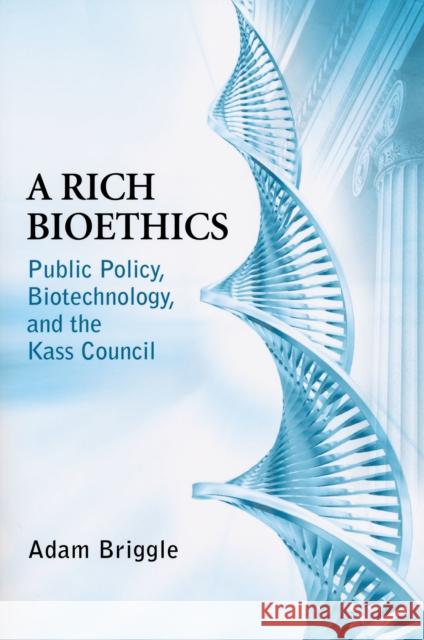A Rich Bioethics: Public Policy, Biotechnology, and the Kass Council » książka
A Rich Bioethics: Public Policy, Biotechnology, and the Kass Council
ISBN-13: 9780268022211 / Angielski / Miękka / 2010 / 230 str.
A Rich Bioethics: Public Policy, Biotechnology, and the Kass Council
ISBN-13: 9780268022211 / Angielski / Miękka / 2010 / 230 str.
(netto: 111,90 VAT: 5%)
Najniższa cena z 30 dni: 116,06
ok. 22 dni roboczych.
Darmowa dostawa!
Several presidents have created bioethics councils to advise their administrations on the importance, meaning and possible implementation or regulation of rapidly developing biomedical technologies. From 2001 to 2005, the President's Council on Bioethics, created by President George W. Bush, was under the leadership of Leon Kass. The Kass Council, as it was known, undertook what Adam Briggle describes as a more rich understanding of its task than that of previous councils. The council sought to understand what it means to advance human flourishing at the intersection of philosophy, politics, science, and technology within a democratic society.Briggle's survey of the history of U.S. public bioethics and advisory bioethics commissions, followed by an analysis of what constitutes a "rich" bioethics, forms the first part of the book. The second part treats the Kass Council as a case study of a federal institution that offered public, ethical advice within a highly polarized context, with the attendant charges of inappropriate politicization and policy irrelevance. The conclusion synthesizes the author's findings into a story about the possible relationships between philosophy and policy making. "Adam Briggle has written a rich and sympathetic account of the President's Council on Bioethics led by Leon Kass. It puts in historical context the efforts of this council to move beyond the limited 'instrumentalist' approaches to bioethics taken by earlier commissions, toward a more philosophically serious effort to deliberate on the human goods put in play by modern biomedicine. In the process it answers many of the charges of politicization and corrects the record concerning the council's work." --Francis Fukuyama, The Johns Hopkins School of Advanced International Studies"What an eloquent, humane, and wise book. Briggle discovers an imperfect yet fascinating effort to bring the world of biomedical research into the domain of public philosophy. His scholarship and generosity make clear that a democratic society need not be morally shackled to the realm of the possible that science is constantly expanding." --Daniel Sarewitz, Consortium for Science, Policy, and Outcomes, Arizona State University "This is the most persuasive and thoughtful reconstruction of theKass Council's goals and rationale that I haveseen. Adam Briggle's account of the notion of a 'richer' bioethics is comprehensive an well-reasoned." --Jonathan D. Moreno, University of Pennsylvania "Adam Briggle has written a fine book on a complex, controversial topic. He shows the wisdom of the approach to bioethics taken by the Kass Council, sets right the unfair and often nasty attacks on the council and Kass himself, and offers a perceptive and wide-ranging look at the terrain of ethics." --Daniel Callahan, The Hastings Center "











